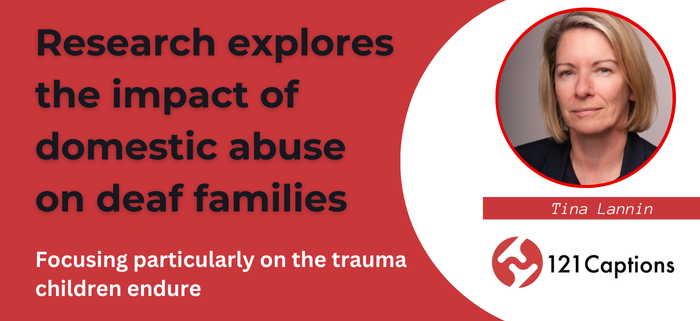Research explores the impact of domestic abuse on deaf families
A groundbreaking research project is set to investigate the profound impact of domestic abuse on deaf families, focusing particularly on the trauma children endure when relied upon as interpreters for their deaf mothers. This study, the first of its kind, seeks to uncover the challenges faced by deaf survivors and their families.
Children as co-victims in domestic abuse
Led by Professor Jemina Napier, Chair of Intercultural Communication at Heriot-Watt University, the project will delve into the emotional and psychological strain experienced by children who are compelled to interpret distressing situations. For deaf mothers, the lack of professional interpreters often becomes a barrier when attempting to report abuse or seek help.
Without adequate support, children are frequently thrust into the role of “language brokers,” bearing the burden of communicating traumatic details to police or support services. This dynamic imposes severe emotional strain on both the child and the parent.
Shining a light on an understudied issue
The study, titled Domestic Abuse in Deaf Families: Perspectives on Children as Co-Victims and Language Brokers, will document the lived experiences of deaf mothers and their families. During its initial phase, researchers will collect insights from deaf survivors and practitioners across the UK. Future phases aim to include the children themselves to further understand their perspectives.
Professor Napier explained:
“There has been very little research with deaf women around language access in the context of domestic abuse. Many deaf women struggle to access information about what domestic abuse entails, how to seek help, or what consent means. We aim to bridge this knowledge gap and understand the ripple effects on children who become interpreters for their mothers in times of crisis.”
Deaf women and the prevalence of abuse
Research shows that deaf women are up to three times more likely to experience domestic abuse than hearing women. Abusers often exploit their deafness as a means of control, using tactics such as coercion, financial manipulation, and gaslighting.
Professor Napier emphasised that many deaf women may not even realise they are victims, as they are often denied access to British Sign Language (BSL) resources and support services. A controlling partner may further isolate them by limiting their ability to communicate with external resources such as the police or charities.
Building on previous research
This new project builds on earlier studies like Justisigns 2 and SILENT HARM, which explored the unique experiences of deaf survivors. These initiatives were co-designed with Lucy Clark, a deaf domestic abuse survivor, who continues to advocate for raising awareness within both deaf and hearing communities.
Lucy shared:
“As a deaf woman who experienced domestic abuse, I found there was a severe lack of BSL resources or cultural understanding within frontline services. It was incredibly isolating. This research is crucial in giving our community a voice and ensuring we’re not forgotten.”
Addressing cultural dimensions of abuse
The research team also includes Tasnim Ahmed, a deaf survivor from an ethnic minority background, who highlights the cultural barriers to seeking help.
“In many communities, traditional norms around honour, family roles, and gender expectations can foster silence around abuse. Victims fear being ostracised or shamed, which perpetuates the cycle of violence,” Tasnim explained.
By collaborating with Police Scotland, Women’s Aid, and organisations such as Deaf Links and SignHealth, the project seeks to understand these cultural dynamics and the additional challenges they create for deaf families experiencing abuse.
Solutions to protect children
One of the primary goals of the study is to propose actionable solutions to reduce the emotional burden on children who are often placed in interpreter roles during times of crisis. The researchers aim to identify and address the communication barriers faced by deaf families, ensuring that professional interpreters are available when needed.
Dr Claire Houghton, an expert in gender-based violence from the University of Edinburgh and a collaborator on the project, underscored the urgency:
“Policymakers must address the rights and needs of deaf women and their children, who often experience abuse together. It’s time for meaningful change.”
Moving towards change
The 12-month study, funded by a British Academy/Leverhulme Small Grant, begins in January 2025. Initial findings are expected to be published in a position paper in December 2025.
By gathering insights from survivors, experts, and practitioners, the project hopes to pave the way for systemic changes that protect deaf women and their families while raising awareness of the unique challenges they face.
This initiative is a vital step forward in ensuring that the voices of deaf survivors – and their children – are finally heard.




Leave a Reply
Want to join the discussion?Feel free to contribute!